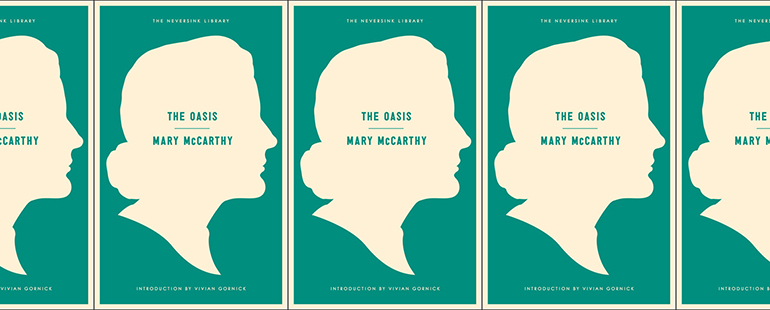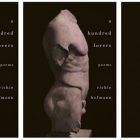Revisiting The Oasis

No one could criticize like Mary McCarthy. Consider her evisceration of J.D. Salinger’s Franny and Zooey: “To be confronted with the seven faces of Salinger [in other words, the Glass family], all wise and lovable and simple, is to gaze into a terrifying narcissus pool. Salinger’s world contains nothing but Salinger.” Or her damning assessment of Tennessee Williams’s Streetcar Named Desire: “His work reeks of literary ambition as [Kowalski’s apartment] reeks of cheap perfume; it is impossible to witness one of Mr. Williams’s plays without being aware of the pervading smell of careerism.” Her book and drama reviews, when hostile, were not just negative evaluations but denunciations; they practically begged to be requoted, preferably in a delighted undertone at a dinner party. My favorite McCarthy takedown might be her pithy dismissal of the collected essays of Kenneth Tynan, an esteemed London theater critic (also the subject of a scathing portrait by his ex-wife, Elaine Dundy, in her 1963 novel The Old Man and Me): “The worst I can say of Tynan is that I thought better of him when I began this book than when I finished it.” This McCarthy drive-by was so inflammatory it went on to generate its own news cycle: “Adverse Review of Tynan’s Book by Mary McCarthy Creates Literary Tempest,” ran a 1961 headline in The New York Times.
An artist of the putdown, however, is certain to face a hostile audience when she tries publishing her own fiction, and during her lifetime McCarthy found few contemporaries inclined to read her novels generously. The overall consensus was that she was too much of a hater to be a great author. “Everyone in her [books] is either ridiculous, stupid, vicious, or silly,” wrote Delmore Schwartz in the pages of Partisan Review, the socialist-leaning magazine where McCarthy was a sometime editor and longtime contributor. (From 1936 to 1949, her legendarily biting “Theater Chronicles” were a regular feature of the Review, one of its main draws during lean years spent getting off the ground in the wake of the Great Depression.)
Schwartz’s attack was leveled at McCarthy’s 1952 novel, The Groves of Academe, but it just as well could have applied to her most scandalous and critically reviled novel, The Oasis, published in 1949. The book was a take-no-prisoners satire of the circle of intellectuals surrounding Partisan Review, depicting a group of self-styled “Utopians”—loosely modeled on the magazine’s editorial staff—who retire to the countryside to found an agrarian colony along the lines of Brook Farm or the Oneida Community. In the face of worsening relationships between capitalist America and communist Russia, their Utopia is a “retreat from atomic warfare,” a “novelty in personal relations” that seeks to prove on a small scale that communitarian ideals can triumph without transforming into Stalinist totalitarianism. Things get off to a bumpy start, and the colony quickly fractures into opposing groups led by the characters Will Taub and Macdougal Macdermott, both of whom are thinly veiled—and highly unflattering—caricatures of Partisan Review editors Philip Rahv and Dwight Macdonald.
Considering their enthusiasm for her critical zingers in the magazine, McCarthy assumed her editors could cope with a satirical portrayal. According to her view of literature, after all, as elucidated in a wonderful 1960 essay entitled “The Fact in Fiction,” the characteristic tone of any novel is “one of gossip and tittletattle.” (She cites the second sentence of Anna Karenina to prove her point: “Everything was upset at the Oblonskys.”) McCarthy was therefore taken aback by the intensity of their animosity once the first copies of The Oasis began arriving in America. (The first edition had been published in the British periodical Horizon.) “That woman is a thug,” announced Diana Trilling at a meeting convened by Rahv to discuss how to respond to McCarthy’s book. Rahv’s preferred solution was to sue McCarthy for libel, hoping thereby to block its American distribution. Rahv was persuaded by Macdonald to give up the idea of a lawsuit, but he proceeded to excommunicate McCarthy from the Review’s inner circle. For the rest of McCarthy’s career, a certain stereotype would crystallize around her, emanating largely from the influential group surrounding Partisan Review. “She was a great wit, but she was not a great thinker,” said Isaiah Berlin. “Mary was essentially a polemical writer,” claimed Irving Howe. “[She] didn’t write . . . for the ages. It was always in response to something.” Perhaps most infamously, in the New York Review of Books, Norman Mailer likened McCarthy’s 1963 novel, The Group, to a bowel movement, describing her as a “duncey broad” and asserting that she was “simply not a good enough woman to write a major novel.”
The misogynist implications of these slights are obvious in hindsight, and there has been something of a McCarthy renaissance since the Library of America reissued her collected novels and stories in 2017. (Revisionists have focused particularly on the feminist social critique presented by The Group, and the strikingly contemporary handling of sex and power in the 1942 short story collection The Company She Keeps.) But beyond the ipso facto presumption that a woman can’t be a “great thinker,” there is also a certain kind of positivist bias at play in the dismissal of McCarthy’s fiction by contemporaneous critics. The charge was that McCarthy didn’t stand for anything. That her writing, in its relentless sending up of hypocrisy and self-regard, didn’t put forward its own point of view. These reproaches represent a classically hermeneutic understanding of literature widespread among McCarthy’s set of “New York Intellectuals”—that the absence of an underlying philosophy or thesis (in Mailer’s formulation, “a view of the world which has root”) signifies a fundamental lack. Yet what such a reproach fails to recognize is that the thoroughgoing skepticism of McCarthy’s writing was a philosophy unto itself, one that wedded a robust political critique to an essentially comic vision. Nowhere in McCarthy’s oeuvre is this embodied quite as programmatically as in The Oasis.
Perhaps it shouldn’t be surprising that critics struggled to appreciate the book. It’s a strange little work, clocking in at just over a hundred pages, more novella than novel. In her introduction to the Horizon issue in which it first appeared, McCarthy likened it to a Piero della Francesca painting, a “landscape with figures.” Her point here, I think, was to account for its sometimes peculiar mixture of parable-like elements (Utopia is located in an abandoned resort beside a mountaintop called Nowhere) with its concrete social satire (among the characters is “a middle-aged poet who had once been a Southern agrarian”—Robert Penn Warren). But the description also captures something of the book’s pervading atmosphere: it’s a languorous work in which very little happens. You get the feeling the colonists are moving in slow motion, ambling around with little thought bubbles over their heads. The narrator darts between characters’ minds in McCarthy’s preferred mode of close third person, with ironic detachment turned up to eleven. Like landscape painters, we watch from a bemused distance as the colonists arrive to Utopia, desultorily unpack their things, measure themselves against each other, form judgments, and bicker.
Bickering is perhaps the main subject of The Oasis, and it commences the moment the colonists step off the train. At the beginning, it mostly revolves around a painter named Joe, a controversial figure in the community. Beyond being something of a “yahoo” (he was once, sin of all sins, a successful Massachusetts businessman—“He is the antithesis of everything we stand for!” shouts Macdougal Macdermott at a meeting to discuss Joe’s candidacy before their departure), Joe’s second major transgression occurs when he disturbs Ben Taub, the Rahv stand-in, while Taub is enjoying a moment of contemplative reflection alone atop a hillside. “State Police reporting,” Joe announces playfully when he emerges from the woods pointing his shotgun, giving Taub a serious fright. Taub proceeds to organize a conclave of colonists to expel Joe from their midst, and in the process creates a schism within the community that pits his “realist” faction against a “purist” faction led by Macdougal Macdermott, who has since swung over to Joe’s side. Eventually, the colonists agree to let Joe remain in Utopia, provided he behaves a little more circumspectly with his shotgun.
By this point, however, the community’s idealistic convictions have been tested and found wanting. (“They now felt themselves somewhat dashed to find that they behaved . . . worse together than any of them might have done singly.”) Soon they’re bickering over anything and everything: who’s responsible for a fire in the kitchen that ruins breakfast? When in the morning people are allowed to begin target practice in the fields outside the hotel? And, most importantly, what should the very function of their community be? Should they make communal theater? Publish a periodical? Organize the expatriation of foreign writers into their midst? Or should they focus on producing some agricultural product, setting an example to the world with their shared industry and dedication? They never manage to reach a decision, and, in the end, what brings down the community experiment is something depressingly prosaic: an argument with some hostile neighbors over who has the right to pick the land’s wild strawberries. The neighbors have been coming to the abandoned field for years and refuse to leave; in a bourgeoise assertion of Utopia’s property rights, a group of colonists drives the invaders off by firing Joe’s shotgun in the air. The community goes on to have a picnic in the strawberry field, but all the characters are uneasy, each recognizing in their own way that “a phase of the colony had ended,” and, that, “ultimately, Utopia would fail.” On this sour note, the book ends.
So what’s the meaning of McCarthy’s little parable? Contemporaries, of course, only focused on the personal digs at Rahv and Macdonald, interpreting the book as a mean-spirited attempt to expose the hypocrisy behind their political radicalism. (Fanning the flames was the fact that McCarthy and Rahv had once been lovers.) Later critics, with more distance from the personal squabbles, have focused on the book’s intellectual backdrop, trying to parse the meaning of the debates between McCarthy’s “realist” and the “purist” factions. The historian Hugh Wilford, for example, has shown that the Utopia colony is clearly modeled on a short-lived political organization that McCarthy helped found in the late 1940s named the Europe-America Groups, or EAG. Its stated goal was to “provide solidarity with and support for intellectuals in Europe who find themselves outside mass parties”; McCarthy served as chairman, with Rahv and Macdonald serving as members of the board. In McCarthy’s conception, the EAG would function as a kind of Marshall Plan for non-Stalinist writers, a vehicle for soliciting donations to help support Italy and Germany’s decimated left in the wake of World War II. In practice, however, it quickly devolved into bickering and finger-pointing, with Rahv and his lieutenant, Sidney Hook, arguing that the group wasn’t sufficiently anti-communist. Ultimately, the EAG accomplished very little, and after McCarthy managed to stave off a failed coup, she let it fade into obscurity and turned her attention to writing The Oasis. In Wilford’s appreciative reading, the novel, rather than an act of vengeance, is a “personal confession of political error and failure.” Critics who focus on its oddly undramatic plot and its unsympathetic characters fail to see a trenchant parable that demonstrates how “political ideology is unequal to the task of apprehending the complexity and variety of lived experience,” and how, in dispiriting fashion, “capitalism will always recuperate separatist intellectual movements.”
This is a compelling argument, but it doesn’t address the question of the book’s literary merit. Is The Oasis a good novel? Do McCarthy’s books demonstrate a “vision of the world which has root?” To my mind, the fact that so many critics have answered this question in the negative—even McCarthy herself seemed to have internalized the critique, telling the Paris Review, “I’m not sure any of my books are novels”—speaks not only to the inability of the American literary establishment to take seriously a novel whose tone is fundamentally comic; it speaks also to the vision of America that “great American novels” tend to put forward. They’re rarely as relentlessly critical as a McCarthy book.
It’s interesting, in this light, to think about the fate of the EAG. Soon after it was disbanded, Sidney Hook managed to rebirth it in a new form, this time without the moderating influence of McCarthy and Macdonald. Hook’s new organization was called the Congress for Cultural Freedom, or CCF, and it took an extremely hardline stance against communism, particularly against intellectuals who refused to choose sides in the emerging Cold War. The CCF quickly drew the attention of CIA propaganda chief Frank Wisner, who transformed it into a propaganda outlet, his “mighty Wurlitzer” for disseminating ideas beneficial to American interests. At the CCF’s peak, it would funnel hundreds of millions of CIA dollars into a labyrinthine maze of magazines, conferences, concerts, and exhibitions, all dedicated to eradicating the existence of a “non-aligned left” in Europe and the Third World. Countless intellectuals of the 1950s and 1960s—including most of the Partisan Review staff—would become wrapped up in its clandestine efforts. In the 1930s, these writers had been some of the staunchest voices on the American left. Yet in their middle ages, they supported many of America’s greatest Cold War follies, ranging from the Vietnam War to CIA-sponsored coups in Guatemala, Hungary, Iran, Indonesia, Greece, Chile, and the Philippines. Read against this history, The Oasis is not just a story about personal failings and internecine squabbling—it’s also a stark warning about intellectual capture, about what can be lost if you don’t approach politics with a healthy dose of skepticism.



